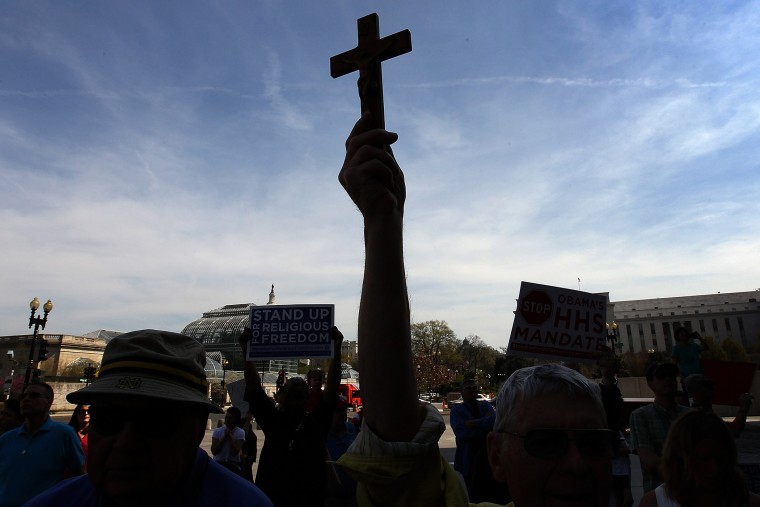Social conservatives were confident they'd finally figured it out. The 2016 race would finally be their year. They had a strategy, a candidate, and an opportunity to wield the power and influence that has long eluded them.
Instead, the Republican presidential race went to a guy who thinks "II Corinthians" is read as "Two Corinthians."
Revisiting our coverage from last year, the pattern started in earnest in 1996. Social conservative leaders and the religious right movement weren't sold on Bob Dole as the Republicans' presidential nominee, but they struggled to rally behind a credible alternative.
In nearly every election cycle that followed, a similar dynamic unfolded. In 2000, the religious right wanted John Ashcroft, who didn't run. In 2008, the religious right hated John McCain, but it couldn't settle on a rival. In 2012, social conservatives were skeptical about Mitt Romney, but again, it failed to coalesce behind someone else.
The movement and its leaders were absolutely determined not to repeat their mistakes. This would finally be the cycle, the religious right's heavyweights insisted, in which social conservatives en masse made an early decision, chose a competitive GOP candidate, and helped propel him or her towards the convention.
After careful consideration and months of deliberation, they chose Ted Cruz to be the religious right's standard bearer. He then came in second.
Bloomberg View's Francis Wilkinson wrote last week, when the writing was obviously on the GOP's wall, "The rout of social conservatives in this campaign is absolute. Their future looks grim."
The problem isn't that Trump has a disco ball where his moral compass should be. It's that he isn't particularly interested in the social conservative agenda -- or even in pretending that he is. Aside from a few comic forays into biblical scholarship early in his campaign, and later comments about abortion that were so off message that they merely confirmed his lack of interest in the topic, Trump is running free and clear of the entire movement. He's leaving social conservatives in the dust.
Worse, Trump's general indifference towards the religious right's agenda doesn't appear to have cost him much of anything.
So what went wrong? Part of the problem is that the effort to keep evangelical leaders united didn't work out as planned. While most social conservative leaders rallied behind Cruz, some -- most notably Jerry Falwell Jr. and Phyllis Schlafly -- broke ranks.
Complicating matters, plenty of rank-and-file evangelical voters saw no need to take orders from the movement's leading organizations. Cruz excelled with so-called "values voters," but Trump made inroads, instructions from the movement's leaders notwithstanding, weakening what was supposed to be one of the Texas senator's key pillars.
But at its root, the religious right's most pressing dilemma is the fact that the movement just isn't as big or as influential as evangelical leaders like to believe. This isn't to say the movement is finished -- these activists still exist and their agenda is still gaining traction in parts of the country -- but on a national scale, social conservatives cannot, by themselves, take control of a presidential nominating contest.
They have the capacity to swing some individual primaries and caucuses -- note the results in Iowa earlier this year, for example -- but if religious right leaders continue to assume it's within their power to dictate the Republican nominee, they won't just be disappointed; they'll also raise questions anew about their relevance.
Last night, as the results in Indiana came in, Bryan Fischer wrote on Twitter, "43 states allow write-in votes for president. Does the write-in campaign for Ted Cruz start tomorrow?"
It represented a sad coda to a failed effort.
